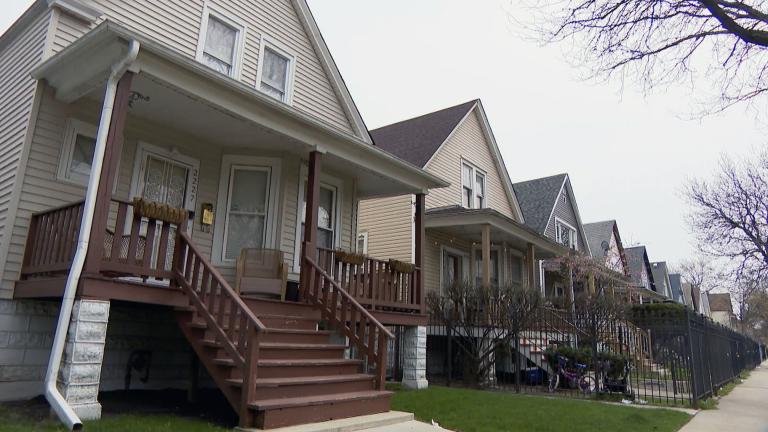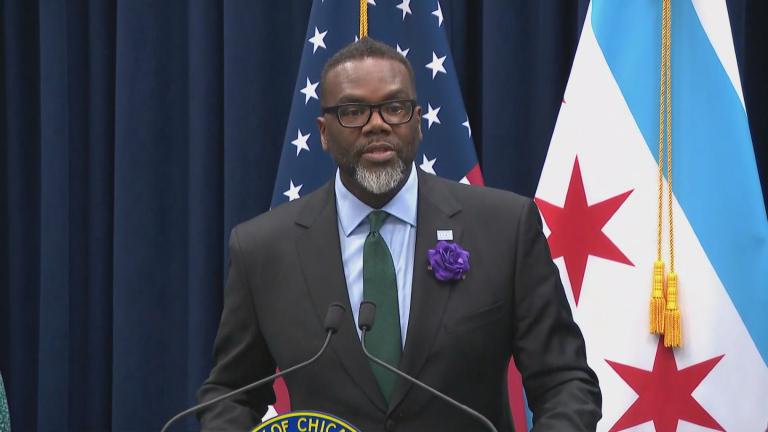 (Daniel Dionne / Flickr)
(Daniel Dionne / Flickr)
Mayor Lori Lightfoot will face the biggest test of her time in office on Wednesday when she steps to the rostrum in an empty Council Chambers at City Hall to detail her plan to fill the massive budget shortfall caused in part by the coronavirus pandemic.
Without imminent help from Congress and the state facing its own fiscal crisis, Lightfoot has to figure out a way to close a projected $1.2 billion shortfall in 2021 — and end 2020 in the black after the pandemic opened an $800 million gap in the current year’s budget.
Aldermen briefed on Lightfoot’s plan say she will propose hiking property taxes by $94 million a year, which would cost the owner of a home worth $250,000 an additional $56 annually.
Lightfoot is also expected to raise Chicago’s 5-cent-per-gallon gasoline tax to 8 cents per gallon, the maximum allowed under the state law passed in June 2019 that hiked the state gas tax by 19 cents to pay for infrastructure projects statewide.
It is unclear how much money the gas tax hike would raise, since many commuters are working from home to avoid being exposed to COVID-19. In addition, the gas tax is one of the most regressive taxes on the books, and will hit the poorest Chicagoans the hardest.
Lightfoot has vowed not to balance the budget on the backs of struggling Chicagoans.
Lightfoot is also expected to wipe 1,000 vacant city jobs off the books, including 450 empty positions in the Chicago Police Department. Her plan is likely to call for the layoffs of between 300 and 500 city employees in March, which could allow time for Congress to pass a relief package for state and local governments after the election — or after the inauguration of a new president.
City employees who are not represented by labor unions could also be required to take five unpaid days as part of an effort to avoid widespread furloughs or service cuts, according to aldermen briefed on the plan.
City officials will once again turn to Wall Street to refinance $500 million in city debt, a technique that the city’s finance team used to balance the city’s 2020 budget, according to the plan presented to aldermen.
In addition, Lightfoot is expected to declare $350 million in the city’s Tax Increment Financing program to be in surplus, which will help close the gap.
Lightfoot is also expected to propose changes to the way the city funds the Chicago Public Schools by asking the district to pick up the estimated $55 million tab for crossing guards and pension payments.
That will likely heighten tensions between Lightfoot and the Chicago Teachers Union, and exacerbate the school district’s budget problems, since officials had counted on an additional $343 million in federal aid that has been blocked by Senate Republicans.
A month after Chief Financial Officer Jennie Huang Bennett told members of the City Council’s Finance Committee that the city should not touch Chicago’s rainy-day fund because of the city’s uncertain financial future — and the fact that no one knows when a vaccine or treatment will end the pandemic — Lightfoot is expected to propose using $30 million from its $900 million savings account to balance its budget.
But as Chicago sees a sharp rise in the number of confirmed cases of the coronavirus, Lightfoot has warned she may have to order businesses to close to stop the spread of the airborne virus — a move that would cause tax revenue to drop more than anticipated, expanding the city’s budget gap.
To pass a budget for 2021, Lightfoot will have to win the support of at least 26 aldermen by the end of the year — no easy task when a yes vote means supporting a big property tax hike and the elimination of thousands of jobs that could haunt them in during the 2023 municipal election.
Lightfoot’s 2020 budget — which closed a gap of $838 million — passed on a vote of 39-11, with most of the dissenting votes coming from progressive aldermen who were displeased that the plan did not reopen mental health clinics closed by former Mayor Rahm Emanuel.
Lightfoot made sure that those who voted against the plan were put on notice by a website launched by her political action committee that said they had voted to hurt “hard-working Chicagoans” and thwart efforts “to put our city finances back on track.”
Since taking office, Lightfoot has worked to restrict aldermen’s power as part of her anti-corruption efforts, and the mayor has not shied away from publicly blasting those who she considers roadblocks to her agenda in the most personal and direct terms.
During the pandemic and unrest, Lightfoot faced frequent criticism that she has not been collaborative enough with aldermen.
When she detailed the size of the budget gap, the mayor acknowledged aldermen’s objections, and vowed to recalibrate her approach
“We need to change the tone of our discourse, and no better place to start than the process we will engage in together over our fiscal future,” Lightfoot said. “And when I say ‘we,’ that includes me as well … I need to push myself harder to work with people with whom I do not agree and who do not agree with me.”
Several aldermen said they had not seen a change in Lightfoot’s approach since then, and acknowledged it could play a role in whether Lightfoot can wrangle 26 votes for her plan without major concessions.
Those negotiations are expected to have to take place virtually amid the raging coronavirus pandemic — even though an effort to hold some budget hearings in person was underway.
But it is not clear if that would be possible amid warnings that all non-essential meetings should be avoided. The City Council has been meeting virtually since April.
Typically, the daylong budget hearings are punctuated by private meetings between aldermen to hash out points of contentions, with aldermen socializing during lunches catered by groups of aldermen to show off restaurants from their wards.
What is expected to be the toughest budget vote of their careers will also be a vote like none other — with the ever-present threat of the virus infusing already tense negotiations.
Contact Heather Cherone: @HeatherCherone | (773) 569-1863 | [email protected]






